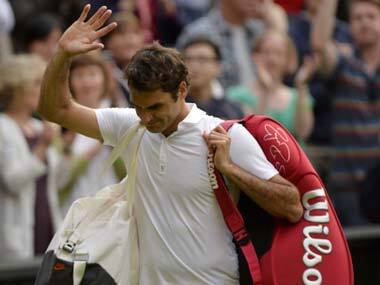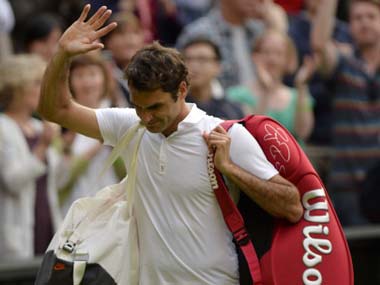Maybe it was the shoes. Roger Federer breezed through his opening round match at Wimbledon in 68 minutes wearing custom-made Nike shoes with orange soles. Then Wimbledon told him he couldn’t wear the shoes anymore because the orange was too much colour. One match later, Federer was bounced from his favourite tournament by a player ranked 113 places below him; and someone who had never made it past the second round at the All England Club. More likely it has to do with age. On a day when seven players retired and one withdrew, when there were more slips, tumbles and falls than you see at a circus, the biggest shock was 31-year-old Roger Federer’s streak of reaching consecutive Grand Slams coming to a screeching halt at 36 on Centre Court in a four-set loss to Segiy Stakhovsky. [caption id=“attachment_910003” align=“alignleft” width=“380”]
 A disconsolate Roger Federer walks off Centre Court after losing in the second round at Wimbledon. AP[/caption] Even Stakhovsy, the newest giant killer in town, couldn’t believe what he had just pulled off. “I’m still lost, he said after the match. “I can’t explain because I’m not feeling it yet. “When you play Roger Federer at Wimbledon, it’s like you’re playing two persons. First you play Roger Federer and then you play his ego. When you’re beating one, you still have the other one who is pressing you. You’re saying, ‘am I about to beat him? Is it possible?’" Turned out it is possible. And we should have seen it coming. Tennis players and the big 3-0 don’t get along very well. The pounding the players bodies take on the courts, the unending adjustments from hard courts to clay to grass and back to hard courts and the sheer volume of tournaments takes its toll. And there are always younger, fitter hungrier players to contend with. Even all-time greats have succumbed. John McEnroe won his last Grand Slam title at 25. Bjorn Borg retired at 26. Jimmy Connors and Ivan Lendl won their last Grand Slams at 29. Pete Sampras was done at 31. The last ball Sampras struck in anger may have come in a victorious US Open final but a few months before that Sampras was unceremoniously dispatched from Wimbledon by 145th ranked journeyman George Bastl in the second round. Including Federer’s win at Wimbleon in 2012, players past their 30th birthday have won a a Grand Slam just 18 times in the Open era (Ken Rosewall won four Grand Slam titles after the age of 33 but he is the exception that proves the rule). Federer will turn 32 in August. This year, there have been starker signs of Federer’s decline. He has won just one tournament all year. That was in Halle just before Wimbledon and he was taken to three sets in the semis and final by Tommy Haas (Haas is 35-year-old and has a career record against Federer of 4-13) and Mikhail Youzhny. This season Federer already has eight losses and a winning percentage of 77%, down from 86% last year and 84% the year before that. Not a drastic fall by any means, but at the top of the mountain, the difference between winning and losing is found in the margins. It is a sign that he is more vulnerable and less able to dig himself out of trouble. Federer has also reached just two of the last 11 Grand Slam finals, with only a Wimbledon title to display since the beginning of 2011. This is in part due to the rise of Rafael Nadal, Novak Djokovic and Andy Murray, but also a result of the inevitable decline that age brings. Against Stakhovsky, Federer looked a step slow both physically and mentally. The Ukranian surprised him with his old-fashioned brand of serve-and-volley and Federer was simply unable to figure out how to neutralise it. The grace and artistry with which Federer plays were there but the cutting edge to his game was missing. Stakhovsky won 61 points at the net and was able to capitalise on Federer’s second-serve, winning 45% of those points while winning 64% of points on his own second serve. In a typical Federer match, at the very least those last two numbers would have been reversed. There is no doubt now that age, and not just the other big three, have caught up with the Fed. None of this is to take away from what Federer has achieved over the course of his career. With a record 17 Grand Slam titles, there is a good case to be made that he is the best ever. But in sports, even the greatest eventually have to face mortality. Where Federer goes from here on will be interesting to watch. He is still a top-class player but he has always measured himself by Grand Slam titles. In that sense, he has been as relentless as his friend Tiger Woods, who, at 37, is facing his own questions about age and injuries, though golf allows for a much longer career than tennis. In what is unquestionably now the twilight of his career, it is hard to see how Federer will win another Slam. When Sampras lost to Bastl, he famously said he felt like he had one more Slam left in him, but Sampras had only Agassi has a true rival back then and Agassi was also in his 30s in 2002. Federer has Djokovic and Murray in the prime of their careers to contend with, and Nadal owns clay (though Nadal’s knees might have the final say on how his career pans out). Federer has said that he plans to play on for a many more years, but can he retain his motivation when he isn’t winning as much? Can he put in the relentless preparation and the training that he needs to if he isn’t going to get the same results? How far can a burning desire to prove people wrong take him? One way or another, we are bound to find out in the near future. But the fortnight is not a total loss. Remember those banned Nike limited-edition orange-soled shoes? They were sold out.
A disconsolate Roger Federer walks off Centre Court after losing in the second round at Wimbledon. AP[/caption] Even Stakhovsy, the newest giant killer in town, couldn’t believe what he had just pulled off. “I’m still lost, he said after the match. “I can’t explain because I’m not feeling it yet. “When you play Roger Federer at Wimbledon, it’s like you’re playing two persons. First you play Roger Federer and then you play his ego. When you’re beating one, you still have the other one who is pressing you. You’re saying, ‘am I about to beat him? Is it possible?’" Turned out it is possible. And we should have seen it coming. Tennis players and the big 3-0 don’t get along very well. The pounding the players bodies take on the courts, the unending adjustments from hard courts to clay to grass and back to hard courts and the sheer volume of tournaments takes its toll. And there are always younger, fitter hungrier players to contend with. Even all-time greats have succumbed. John McEnroe won his last Grand Slam title at 25. Bjorn Borg retired at 26. Jimmy Connors and Ivan Lendl won their last Grand Slams at 29. Pete Sampras was done at 31. The last ball Sampras struck in anger may have come in a victorious US Open final but a few months before that Sampras was unceremoniously dispatched from Wimbledon by 145th ranked journeyman George Bastl in the second round. Including Federer’s win at Wimbleon in 2012, players past their 30th birthday have won a a Grand Slam just 18 times in the Open era (Ken Rosewall won four Grand Slam titles after the age of 33 but he is the exception that proves the rule). Federer will turn 32 in August. This year, there have been starker signs of Federer’s decline. He has won just one tournament all year. That was in Halle just before Wimbledon and he was taken to three sets in the semis and final by Tommy Haas (Haas is 35-year-old and has a career record against Federer of 4-13) and Mikhail Youzhny. This season Federer already has eight losses and a winning percentage of 77%, down from 86% last year and 84% the year before that. Not a drastic fall by any means, but at the top of the mountain, the difference between winning and losing is found in the margins. It is a sign that he is more vulnerable and less able to dig himself out of trouble. Federer has also reached just two of the last 11 Grand Slam finals, with only a Wimbledon title to display since the beginning of 2011. This is in part due to the rise of Rafael Nadal, Novak Djokovic and Andy Murray, but also a result of the inevitable decline that age brings. Against Stakhovsky, Federer looked a step slow both physically and mentally. The Ukranian surprised him with his old-fashioned brand of serve-and-volley and Federer was simply unable to figure out how to neutralise it. The grace and artistry with which Federer plays were there but the cutting edge to his game was missing. Stakhovsky won 61 points at the net and was able to capitalise on Federer’s second-serve, winning 45% of those points while winning 64% of points on his own second serve. In a typical Federer match, at the very least those last two numbers would have been reversed. There is no doubt now that age, and not just the other big three, have caught up with the Fed. None of this is to take away from what Federer has achieved over the course of his career. With a record 17 Grand Slam titles, there is a good case to be made that he is the best ever. But in sports, even the greatest eventually have to face mortality. Where Federer goes from here on will be interesting to watch. He is still a top-class player but he has always measured himself by Grand Slam titles. In that sense, he has been as relentless as his friend Tiger Woods, who, at 37, is facing his own questions about age and injuries, though golf allows for a much longer career than tennis. In what is unquestionably now the twilight of his career, it is hard to see how Federer will win another Slam. When Sampras lost to Bastl, he famously said he felt like he had one more Slam left in him, but Sampras had only Agassi has a true rival back then and Agassi was also in his 30s in 2002. Federer has Djokovic and Murray in the prime of their careers to contend with, and Nadal owns clay (though Nadal’s knees might have the final say on how his career pans out). Federer has said that he plans to play on for a many more years, but can he retain his motivation when he isn’t winning as much? Can he put in the relentless preparation and the training that he needs to if he isn’t going to get the same results? How far can a burning desire to prove people wrong take him? One way or another, we are bound to find out in the near future. But the fortnight is not a total loss. Remember those banned Nike limited-edition orange-soled shoes? They were sold out.
Tariq Engineer is a sports tragic who willingly forgoes sleep for the pleasure of watching live events around the globe on television. His dream is to attend all four tennis Grand Slams and all four golf Grand Slams in the same year, though he is prepared to settle for Wimbledon and the Masters.
)